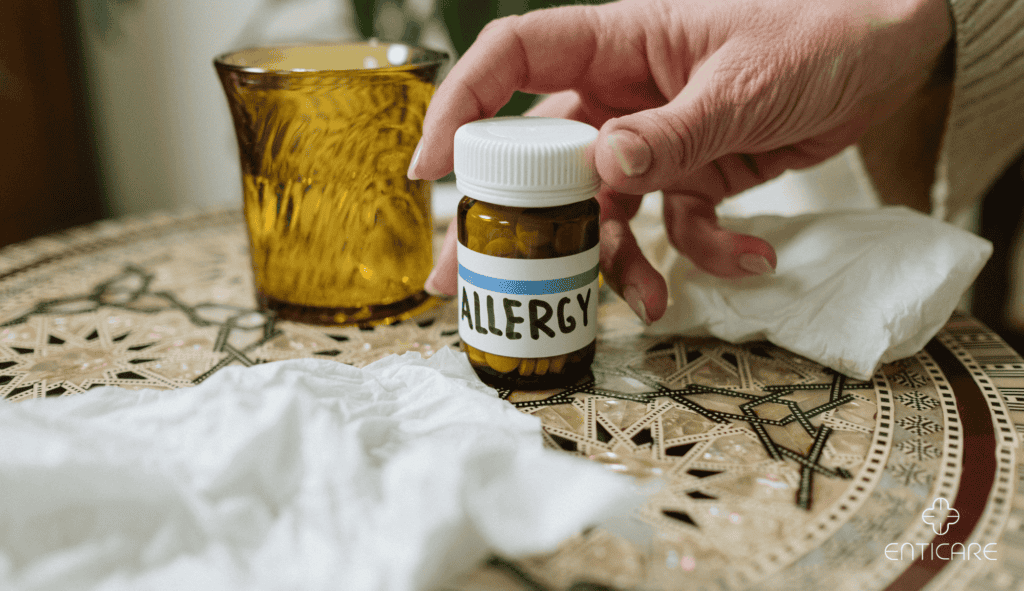Grass allergy can significantly impact your daily life, leading to frustrating symptoms like sneezing, itchy eyes, runny nose, and coughing. If you’re one of the many who suffer from grass allergies, you might be wondering how to get allergy relief. Allergic rhinitis is a common condition caused by grass pollen, leading to symptoms like sneezing, runny nose, and itchy eyes. The good news? Various treatments are available to help you manage these symptoms effectively.

What Is Grass Allergy? Understanding Your Symptoms
Grass pollen allergy occurs when your immune response overreacts to proteins found in grass pollen. This specific type of allergy triggers a range of symptoms that can feel like a never-ending cold during allergy season.
Common Symptoms of Grass Allergy
Grass allergy symptoms can vary from mild to severe. An allergic reaction is the body’s immune response to grass pollen, leading to symptoms like sneezing, itchy eyes, and a runny or stuffy nose. Common reactions also include itchy or watery eyes and throat irritation. In some cases, grass pollen can also trigger asthma-like symptoms, such as coughing and wheezing.
The Grass Allergy Seasons and Seasonal Allergies
Grass allergies peak during the spring and early summer when grass pollinates. However, depending on where you live and the types of grass around you, your symptoms may persist throughout the warmer months. Identifying the exact time your symptoms flare up and monitoring the pollen count can help you choose the right treatment.
Best Over-the-Counter Medications for Grass Allergy Relief
Over-the-counter (OTC) allergy medicine offers a convenient first line of defense for grass allergy relief. Selecting the right medication is crucial for effective relief, as it should be based on personal triggers and symptoms. These medicines work quickly to alleviate symptoms and can be easily integrated into your routine.
Antihistamines
Antihistamines block the histamine released by your immune system when exposed to allergens like grass pollen. Popular OTC antihistamines include cetirizine (Zyrtec), loratadine (Claritin), and fexofenadine (Allegra). These medicines can reduce sneezing, runny nose, and itchy eyes, often within hours. For severe allergy symptoms, stronger antihistamines may be needed.
Decongestants
Decongestants like pseudoephedrine (Sudafed) can help relieve nasal and sinus congestion caused by grass allergies. They work by shrinking the blood vessels in your nasal passages, allowing you to breathe easier. You can use them in combination with antihistamines for more comprehensive relief, but avoid long-term use to prevent side effects like increased blood pressure.
Nasal Sprays for Nasal Congestion
Nasal sprays, such as fluticasone (Flonase) or mometasone (Nasonex), are another powerful option for treating grass allergy symptoms. Nasal spray is highly effective in relieving congestion, itching, sneezing, and a runny nose. These steroid-based sprays reduce inflammation in the nasal passages, helping relieve congestion and runny nose. You may need to use them daily during peak allergy seasons for the best results.
Corticosteroids
Corticosteroids are a powerful class of medications that help suppress inflammation caused by allergies. Available in various forms, including inhalers, nasal sprays, and eye drops, corticosteroids are particularly effective in treating symptoms like nasal and sinus congestion and itchy eyes. These medications work by reducing inflammation in the nasal passages and other affected areas, providing relief from persistent allergy symptoms. Often prescribed for long-term use, corticosteroids can help you maintain control over your allergy symptoms throughout the allergy season.

Prescription Medications for Grass Allergy
If OTC medications fail to provide enough relief, you may need to explore prescription options. These medicines are stronger and can target more severe symptoms. In cases of a life-threatening allergic reaction, such as anaphylaxis, prescription medications and emergency treatments like epinephrine shots are crucial for immediate medical attention.
Prescription Antihistamines
While most antihistamines are available over-the-counter, stronger or more fast-acting versions, such as desloratadine (Clarinex), require a prescription. If your allergy symptoms are particularly persistent, your doctor may recommend these alternatives for enhanced relief.
Leukotriene Receptor Antagonists
Montelukast (Singulair) is a leukotriene receptor antagonist that targets chemicals involved in allergic reactions. It helps manage symptoms like nasal congestion, sneezing, and itching, especially in individuals who experience asthma-like symptoms alongside grass allergies. Your doctor may prescribe this medication if your allergies affect your lungs and airways. Leukotriene receptor antagonists can also treat hay fever symptoms.
Immunotherapy (Allergy Shots)
Immunotherapy is a long-term treatment option for people with severe grass allergies. This treatment involves getting regular allergy shots over a period of time, which gradually desensitizes your immune system to grass pollen. While this treatment takes time to show full results, many people experience lasting relief after completing a course of immunotherapy.
Natural and Alternative Remedies for Grass Allergy Relief
For those seeking alternative approaches to allergy treatment, several natural and alternative remedies may help reduce grass allergy symptoms. While these options may not be as fast-acting as medications, they can complement your overall treatment plan.
Saline Nasal Rinses
Saline nasal rinses, such as a neti pot, can help flush out allergens from your nasal passages. Using a saline solution helps wash away pollen and reduce inflammation, providing immediate relief from nasal congestion and irritation.
Butterbur Supplements
Butterbur is an herb shown to reduce allergy symptoms like sneezing and nasal congestion. Some studies suggest butterbur can be as effective as antihistamines without causing drowsiness. However, consult your doctor before trying butterbur, as it may interact with other medications.
Air Purifiers and HEPA Filters
Reducing your exposure to grass pollen can also make a significant difference in managing allergy symptoms. Air purifiers with HEPA filters trap pollen and other allergens, keeping indoor air cleaner. Using a HEPA filter in your home can help minimize allergic reactions, especially during peak pollen seasons.

Potential Side Effects of Grass Allergy Medications
While grass allergy medications can provide relief from symptoms, they can also cause side effects. It’s essential to be aware of these potential side effects and discuss them with your doctor.
Common Side Effects
Different types of allergy medications can have various side effects. Here are some common ones to be aware of:
-
- Oral Antihistamines: These medications, such as cetirizine (Zyrtec) and loratadine (Claritin), can cause drowsiness, dizziness, dry mouth, and stomach upset. While newer antihistamines are less likely to cause drowsiness, it’s still a potential side effect.
- Nasal Sprays: Steroid-based nasal sprays like fluticasone (Flonase) and mometasone (Nasonex) can sometimes cause nasal congestion, runny nose, and sneezing, especially when first starting treatment.
- Decongestants: Medications like pseudoephedrine (Sudafed) can lead to insomnia, anxiety, and an increased heart rate. It’s important to use these medications as directed and avoid long-term use.
- Corticosteroids: Oral or inhaled corticosteroids can cause weight gain, mood changes, and increased blood pressure. These side effects are more common with long-term use.
- Immunotherapy (Allergy Shots): While generally safe, immunotherapy can sometimes cause allergic reactions, itching, burning, or stomach troubles. It’s important to monitor for any adverse reactions and report them to your doctor.
Choosing the Best Allergy Medicine
Choosing the best allergy medicine involves considering several factors to ensure you get the most effective relief for your specific symptoms.
Factors to Consider
-
- Symptom severity: If you have mild symptoms, over-the-counter (OTC) medications may be sufficient. However, if you have severe symptoms, prescription medications may be necessary.
- Time of year: If you have seasonal allergies, consider medications that are specifically designed to target seasonal allergens, such as pollen or grass.
- Individual preferences: If you prefer a non-drowsy medication, look for second-generation antihistamines or nasal sprays. If you prefer a medication that can be taken on an as-needed basis, consider decongestants or antihistamine nasal sprays.
- Age and health status: If you’re pregnant, breastfeeding, or have underlying medical conditions, consult with your healthcare provider before taking any medication.
- Cost and insurance coverage: Consider the cost of the medication and whether it’s covered by your insurance plan.
Take Charge of Your Grass Allergy Treatment Today
Don’t let grass allergies disrupt your life any longer. Whether you opt for OTC medications, prescription treatments, or alternative remedies, you have several options for finding relief from symptoms. However, if your allergies continue to interfere with your day-to-day activities, schedule an appointment with a specialist who can help you develop a personalized treatment plan.
Take the first step toward better health, and schedule your consultation today! Click here to book your appointment.

